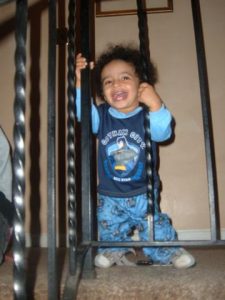
Adults who have lived with the condition of SA/CRS and parents who have raised children with SA/CRS offer some tips from their experiences to help guide your journey.
“I know there is a lot to digest when you find out your child has SA/CRS, but I suggest parents be really careful about what they share all over public media, or in their vlogs, or on their personal websites. As a baby, I can’t tell you yet how I feel about having everything about my life broadcast publicly, but I will grow up into a teenager, and an adult. I may be very uncomfortable with people being able to find out intimate details about my life with SA/CRS. Let the story of my life be MY STORY, so I can control what and when and how my story is told.” an adult with SA/CRS
“I thought I would end up spending all my time in a doctor’s office or a hospital. I thought I would end up spending all my money on medical treatments and therapy for my child. Guess what! I spent all my time at the disability sports events, birthday parties and music recitals and school plays, and I spent all my money on sports equipment and musical instruments and birthday gifts and theater tickets!” the parent of a child with SA/CRS
“If you blame yourself for my condition, I will then blame myself for your guilt. Focus on reminding me that you love me just the way I am and that you are proud of all that I can accomplish, and if that is true, then you have nothing to blame yourself for at all. ” an adult with SA/CRS
“Life with SA/CRS is not a competition to see who has the most “issues”. Remember, your child is not just a list of symptoms. Your child is a person .” the parent of a child with SA/CRS
“Remember that your child is learning how to respond to others who might stare, convey pity, or even bully from YOU. Make sure you model for your child the ways to respond that will be effective. When you show your child how to take charge, maintain confidence, educate, redirect, or just calmly leave the scene, your child gains many tools for self-advocating in the future.” the parent of a child with SA/CRS
“The way you talk about me impacts my self esteem. I am not “unfortunate”, “dependent”, “limited” “diseased” or “deformed”. I have a rare condition, that’s it. Move on.” an adult with SA/CRS
“The more you protect and do things for me, the less I learn about being an independent, thriving adult. Be supportive, be encouraging, and be empathetic but don’t coddle me.” an adult with SA/CRS
“Don’t put all your hopes and dreams in whether or not your child will walk. Wheelchairs are not evil. Wheelchairs are not a sign of failure. Your child needs mobility that works for your child, not mobility that happens to work for you. I love my wheelchair. It provides me with freedom and independence and an ease of mobility that I could never achieve on two feet. It’s part of me and part of who I am. It allows me to put my focus and energy on the things that are important in life instead of on how I move from one place to another.” an adult with SA/CRS
“Make sure you find more things that show your child what he or she CAN do than tell your child what he or she CAN’T do.” the parent of a child with SA/CRS
“As a parent, you are going to have to make medical decisions that don’t always have clear answers. Learn what you can, gather different perspectives, and then decide. Don’t make decisions about what is best for YOU. Make decisions about what is best for your child in the long run. You are the adult. Don’t push difficult decisions off onto your young child by waiting until your child is “old enough” to decide. When is “old enough”? By then, it’s often too late and a much more complicated and disruptive process. On the other hand, do involve your child increasingly in decisions, and aim to present mulitple perspectives. When your child does reach an age to have educated input, make sure that input is a priority.” the parent of a child with SA/CRS
“Your child is not going to grow up to blame you for 1.) having SA/CRS, or 2.) making difficult decisions. As long as you tried to do what you thought was best and loved your child, your child is not going to blame you.” an adult with SA/CRS
“I think most parents start off thinking this is going to be a very difficult journey. I’m not saying that it’s always easy, but I’ve found there were so many amazing, happy, proud, joyful, wonderful moments. Whatever was difficult just pales in comparison.” the parent of a child with SA/CRS
“Parents LISTEN to adults who live with this condition. They have a lifetime of advice to offer. ASK them, and learn about what they have to say.” an adult with SA/CRS
“I like what my mom told me. “You going to get noticed because of your physical differences. Just make sure you put being noticed to good use and stand out for real accomplishments.” an adult with SA/CRS
“If at all possible, help your child to connect with others who have this condition-no matter how many miles you must drive or how much technology it takes, make this effort. Get them to disability sports events, connect them with pen pals, enroll them in disability summer camps, reach out! Interacting with everyone else is fine too, but your child gains so much by knowing there are others who are living with similar experiences.” an adult with SA/CRS
